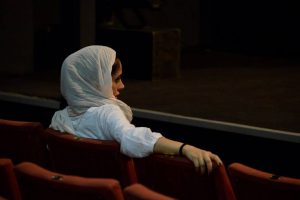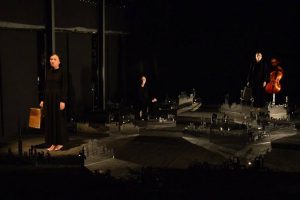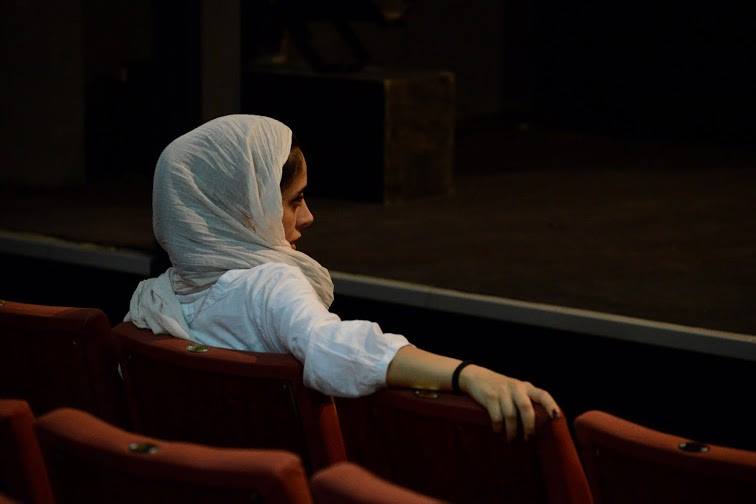by Elisabed Gedevanishvili
I am sure you have never heard of an inspiring artist, Diana Fathi. Diana was born on the first night of fall into a family of doctors. As a teenager she was quite shy, and her English accent always got in the way of proudly speaking in her native language, Farsi. After finishing school quite young at the age of sixteen, she had two choices that lay ahead of her: she could either be a doctor or an engineer. Diana was never forced to choose, but as she said, “all parents love their children to be engineers or doctors. But I hate blood.” She majored in engineering. Today she is a theatre actress, on her way to master the philosophy of arts.
teenager she was quite shy, and her English accent always got in the way of proudly speaking in her native language, Farsi. After finishing school quite young at the age of sixteen, she had two choices that lay ahead of her: she could either be a doctor or an engineer. Diana was never forced to choose, but as she said, “all parents love their children to be engineers or doctors. But I hate blood.” She majored in engineering. Today she is a theatre actress, on her way to master the philosophy of arts.
Diana’s life growing up and maturing was hard. Surrounded by wars, attacks and personal problems, it’s no surprise that her role model is a famous German writer Herta Muller, whose parents lived through WWII and who wrote war-inspired novels such as The Hunger Angel and The Land of Green Plums. Inspired by individuals like Muller, Diana dreams of becoming one of those women who change something in this world: “I must be one of those women. I want to change something for human beings, not for me or my family or my country, but for the whole galaxy. It’s my duty. I’m working hard to do this.” When asked what she wanted to be in life she proudly replied, “I have never wanted to be a man. I love women who are strong and full of emotions. Personally, I live with my feelings and emotions. We should let out everything. I always think with my heart first and then with my brain. If I want to cry, I cry. I am not afraid of crying. I am not afraid of saying how I am feeling. That is the kind of person I want to be, that is the kind of person I am trying to be”.
After Diana graduated with a diploma in engineering, she spontaneously decided to follow the life of a theatre actress. When she met a strange man in the streets of Tehran, she wanted to do something with creating, because according to her, “when you create you are one step closer to god, because god to me is the creator of our world.” This strange man, who seemed very interesting at first glance, invited Diana to a bar, where he suggested that she tried studying theatre. Surprisingly enough, her reply to this random suggestion was “I will”.
“The reason to why I agreed was simple,” she said when she saw my expression (who wouldn’t be shocked to hear someone agree to an offer this random?) “Theatre was the only form of art that I didn’t know, so I took a risk and a big one.” At that time, as always, “theatre was one big mafia.” Every actress had to work very hard to be in this “mafia,” and Diana was no exception: “I was completely alone and I had to do it on my own, each time small roles, but I never said no,” she said, mind wandering in time. She paused before going on: “I was at a party dancing with a boy or a girl, I can’t really remember. Suddenly some guy, a famous director approached me and asked me to be in his play. I knew how to dance, I had done ballet for ten years so the next day, when I went to the rehearsal I got the role. I played for a year and a half and then they omitted me completely. Theatre is one big mafia as I said. For women it’s double that mafia”.
As it turned out the director had given Diana an ultimatum. She had to be in a relationship with him, and if she refused he would do everything to disable her from being a successful actress. When Diana categorically refused to be someone’s girlfriend for a spot in the world of acting, all roads that led to theatre were closed for her. Day by day she moved forward, from translating plays to mopping floors in the theatre, from mopping floors to playing small parts, from playing small parts to directing her own play here in Georgia.
After failing to persuade artists back home to work on a collaboration, Diana arrived in Georgia as a theatre director. She wanted to do something strange, something unordinary. “My childhood is tied with war,” she told me. “I want to show the world my opinion about war and say–please no war. We together can change everything.
 “Think about it: when you say war the first things you see in your mind are soldiers, guns, bullets. These soldiers are men, they are the ones who have participated in all wars by force or by will. All wars are led by men: Hitler, Stalin. But what about women? What about children? Who looks after them? What’s happening to them? In the brochure we made for the play it says that the performance is about my childhood memories. My childhood memories are tied with war; my whole life is tied with war. Women are always in their houses, you will never find them in the first rows of the army, they are always in the back. What’s happening to them? I want to show this to the world. They are secondary persons in war, no one cares about them. In Iran-Iraqi war two million soldiers were killed from the Iranian side. After that Iranian government forced families to bear children. Who did it? Of course, women”.
“Think about it: when you say war the first things you see in your mind are soldiers, guns, bullets. These soldiers are men, they are the ones who have participated in all wars by force or by will. All wars are led by men: Hitler, Stalin. But what about women? What about children? Who looks after them? What’s happening to them? In the brochure we made for the play it says that the performance is about my childhood memories. My childhood memories are tied with war; my whole life is tied with war. Women are always in their houses, you will never find them in the first rows of the army, they are always in the back. What’s happening to them? I want to show this to the world. They are secondary persons in war, no one cares about them. In Iran-Iraqi war two million soldiers were killed from the Iranian side. After that Iranian government forced families to bear children. Who did it? Of course, women”.
In the performance that lasts for forty minutes, five different women appear. All five women with the exception of one have lived as neighbors in Iran, Afghanistan, Iraq, Georgia and the USA. Although these women may speak five different languages, they are no different from each other. They are killed because of wars, with no regards paid to their nationality. When I first saw the performance I was thrilled. Not knowing what to expect when walking into the hall, I was amazed. Five women were dressed in all black, walking, while a man in the middle played a sad, sad melody on an instrument. Suddenly one woman started talking in a language I had no idea about. During the interview I shared my initial surprise, then Diana explained to me “you don’t need to understand Farsi to feel the emotions the woman is feeling. It’s important to feel because the emotions are important. For example, the Iranian character talks about chemical attacks. Sorry, but you don’t know what it’s like to experience a chemical attack. You don’t have any idea about people experiencing chemical warfare. You don’t need to understand what is she saying, because even if it was in your native language you wouldn’t understand, you can only feel.” As she talked I realized that the idea had served its purpose, the play was truly unordinary; it was not only about women but about human beings and their nature in general.
Depicting women and their world during war impressed me and influenced the way I view war and aggression. Even in the modern world women are often considered what Diana calls “secondary class citizens.” In her country, Iran, “forty years ago a woman was just a decoration.” According to Diana when you walk in the streets of the capital of Iran, Tehran, you will never see an uncovered head of a woman. Banners and television advertisements never show women with long, shiny hair suggesting different shampoos. All you ever see are short-haired men advertising hair conditioners. When these men fell as young boys they were always told that “men never cry, crying is for girls.” Diana explained that many women and men oppose the patriarchy rooted into Iranian culture, but that these individuals are never free to declare their opinions publicly–why would they be when the law does not allow women to not wear scarfs?
Although in our interview Diana said that calling someone an artist is very hard, I truly believe that the life she has led for 24 years has been the one of an artist–the life of a strange artist who prefers to spend her evenings without internet and who prefers to live in a village next to people who have lived their lives in between the beautiful, rural landscapes of Iran.
